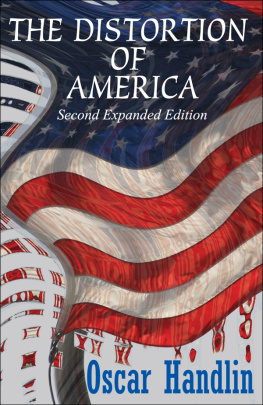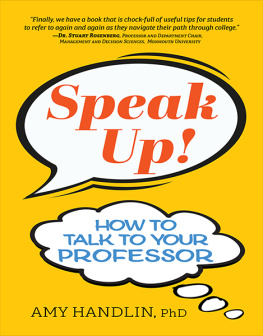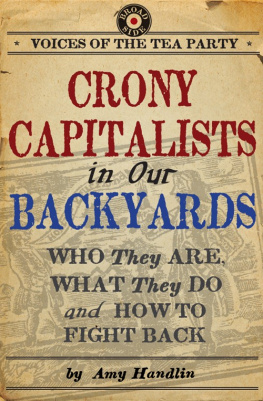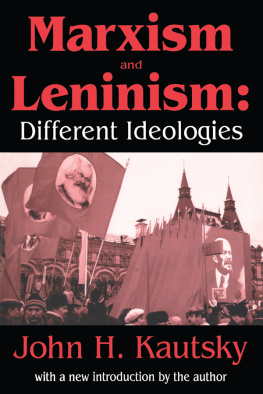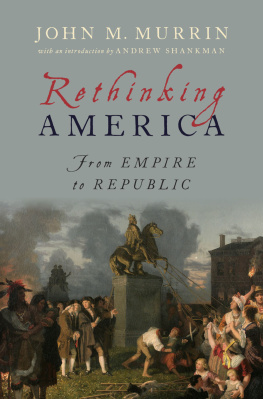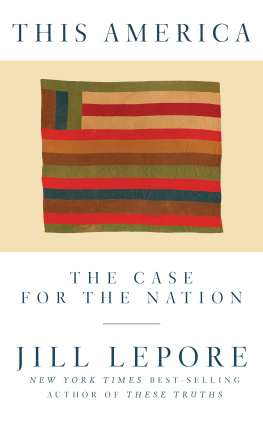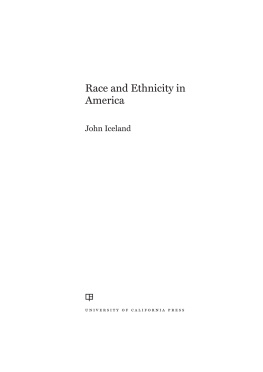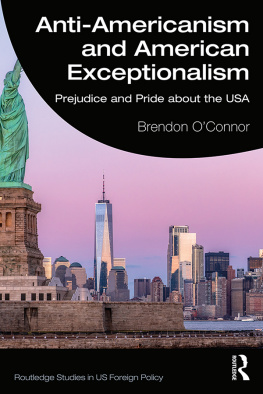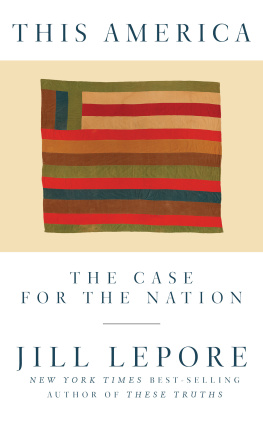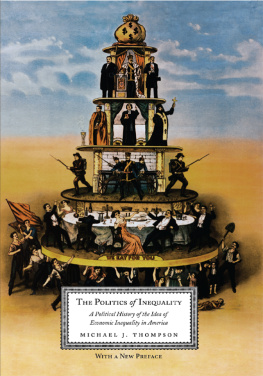Originally published in 1981 by Little, Brown and Company
Published 2017 by Routledge
2 Park Square, Milton Park, Abingdon, Oxon 0X14 4RN
711 Third Avenue, New York, NY 10017, USA
Routledge is an imprint of the Taylor & Francis Group, an informa business
New material this edition copyright 1996 by Taylor & Francis.
All rights reserved. No part of this book may be reprinted or reproduced or utilised in any form or by any electronic, mechanical, or other means, now known or hereafter invented, including photocopying and recording, or in any information storage or retrieval system, without permission in writing from the publishers.
Notice:
Product or corporate names may be trademarks or registered trademarks, and are used only for identification and explanation without intent to infringe.
Library of Congress Catalog Number: 95-37596
Library of Congress Cataloging-in-Publication Data
Handlin, Oscar, 1915-
The distortion of America / Oscar Handlin ; with a new introduction by the author. 2nd expanded ed.
p. cm.
Includes bibliographical references (p. ).
ISBN 1-56000-237-9 (cloth : alk. paper)
1. Anti-Americanism. 2. Communism. 3. United StatesForeign relations1945-1989. 4. United StatesPolitics and government1945-1989. 5. United StatesRace relations. 6. United StatesHistoriography. I. Title.
E744.H348 1995
973.92dc20
95-37596
CIP
ISBN 13: 978-1-4128-5585-3 (pbk)
Introduction to the Transaction Edition
Right at the Wrong Time
IN THOSE days we met periodically for lunch at the Cafe Ted Weeks and Charlie Morton of the Atlantic, Larry Winship of the Globe, and sometimes Ed OConnor. Crossing the river, I emerged from my academic shell and encountered the real world, or at least that viewed by experienced journalists. I had liberated myself from addiction to mammoth American dailies during my residence in Switzerland, where the Neue Zricher Zeitung concisely gave me all I needed to know of world events; but now and again I welcomed reassurance about how little I missed through having kicked the habit.
Out of those encounters sometimes emerged suggestions for little essays unclouded by the haze of conventional attitudes daily conveyed in print or over the air. I lacked expertise in economics or political science that bogged down my Cambridge colleagues, and, never having held political office, had no commitment to an established position. Nor could I advance any overarching theoretical scheme to make world events comprehensible. A pragmatic, rather crude common sense held together our lunchtime discussions; and the short articles that resulted arrived at no subtle conclusions and revealed no sensational discoveries. The passage of time, however, proved them surprisingly correct in analysis, unlike much more weighty discussions printed at the time.
Preparing those old materials for republication, I confronted a tantalizing questionhow did I know? I had not specialized in Russian or Chinese history or in social theory. Yet early on I perceived the failure of Communism at a time when those more learned than I still hailed its victory in the Soviet Union and foresaw a process of convergence in which the western and the eastern models of society would grow increasingly alike.
This error stemmed from several sources. The party members, true believers, trapped by faith, floated along in an unreal world until jolted into reality. Their mistakescomprehensibledid less damage than those of the deluded fellow travelers, who drifted through Leningrad and Moscow in a haze of vodka and good intentions. Their fantasies require little comment; Paul Hollanders Political Pilgrims (Lanham, Maryland, 1989) maps their erratic wanderings. And the deluded intellectuals reluctant to unloose their grip on positions taken in the 1930s presented ominous but familiar warnings of the perils of unconfined pride in brain power. Faith blinded them to the evidence and anti-Americanism kept their faith alive.
The delinquency of American journalists blocked off any glimpse of Soviet realities. From Walter Duranty to Harrison Salisbury, a flow of false reports drew a curtain around the realities of life, first in the Soviet Union and then in China. Systematic blindness shut off the vision of millions slaughtered in purges or sacrificed in planned famines.
I do not tease myself with illusions of superior brain power. But the historians training imbued me with a sense of the sacred qualities of evidence; and travel in Europe took the edge off my anti-Americanism. Above all, innate reticence kept me quiet unless I knew about what I spoke.
In the 1930s they were all Marxists of sorts, and in the 1940s and 1950s also certainly in Brooklyn and Cambridge. Uninformed though enthusiastic, they had usually read only the available polemics the Communist Manifesto or the Eighteenth Brumaire and they could argue about the class struggle or the final stages of capitalism. But get on to the theory of primitive accumulation or, in general, to the operation of the dialectic, and they were lost. Nor did I meet many willing to consider why the revolution had come in Russia rather than in Britain, in a backward agricultural society rather than in an advanced economy as Marx had predicted. In all the years of drifting through the discussion groups, only a Japanese student of economics knew enough to go beyond the phrases and he, I suspected, had not gone beyond Volume 1 of Das Kapital, the only one then translated into English.
In those conspiratorial times, familiarity with the texts put me off limits to recruiters. No signatures on petitions, no picket lines. Under cover! the obvious explanation for the lack of action combined with the depth of knowledge. In those innocent times, also, word of mouth introduced me to a network of the like-minded in New York, Washington, and London nice people, airy dreamers, conspiratorial, quite untrustworthy. I did not have to read Conrad to recognize the type. Talk of convergence therefore never took me in, not even when a posthumous revision of Merle Feinsods How Russia is Governed plastered a benign visage over the authors original, more accurate depiction of Soviet power.
The dismal record of falsification sometimes naive, sometimes sinister reached back to the 1920s. Although honest radical visitors like Alexander Berkman and Emma Goldman immediately perceived the repressive nature of the Soviet regime, other Americans launched blindly into a long, tortuous course of self-deception, eagerly gulping down the fatuous account of the new Communist civilization by Sidney and Beatrice Webb (1936). Deluded Communists and their sympathizers in the United States responded to the Moscow trials, the Hitler-Stalin pact, and the Katyn massacres with no more than pathetic efforts at justification. The illusions about the benign Soviets survived after the wars end and also after the appeasement that began at Yalta and that called for the sacrifice of Eastern Europe. Cheerfully in 1971 the officers of the National Education Association concluded a two-week visit by blithely announcing that the Soviet Union had eliminated poverty within its borders.
The hapless sympathizers who ruled the media and the academic and entertainment worlds were not all stupid or ill-informed, but deliberately blinded themselves to the reality. Countless arguments made the mechanism familiar. The fate of Radek and Zinoviev, the invasions of Poland and Finland, the Jewish doctors conspiracy, and the suppression of the Hungarian and Czech rebellions evoked the identical response: reference to the worse shortcomings of the United States Sacco-Vanzetti, the Scottsboro boys, racism and McCarthyism as if evocation of a dark capitalist counterimage would lighten the dismal aspect of Russian Communism. Drawing upon a long tradition of intellectual anti-Americanism, fashionable journalists and academics from Madison Avenue to Hollywood and Ivy League universities, who had learned to sneer at the Main Street booboisie, slipped readily into the habit of denouncing their countrys greed, intolerance, racism, and general backwardness that would shortly lead to the total collapse of capitalism. Their distorted vision obscured what actually transpired both within the United States and in the world outside its borders. The tragic outcome myopia about the Red threats to peace and liberty everywhere, along with failure to understand the underlying strength of the United States and its relevance to the worlds future.

